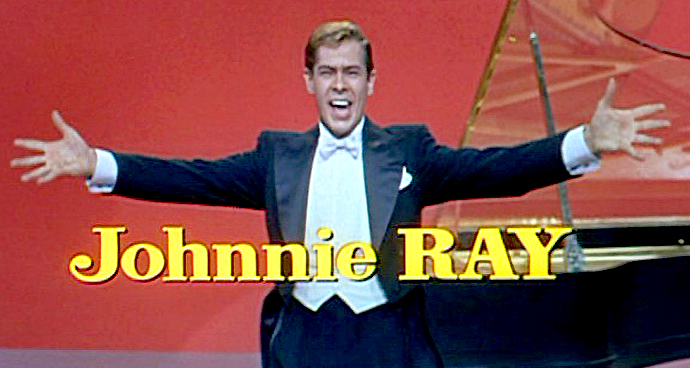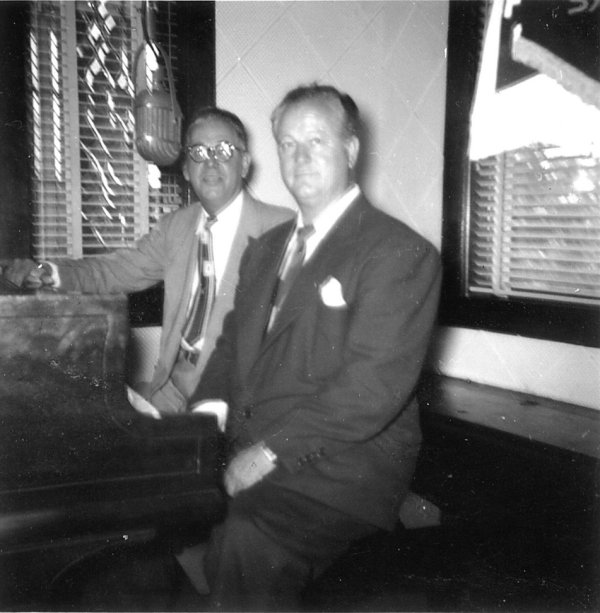|
Ain't Misbehavin' (song)
"Ain't Misbehavin" is a 1929 stride jazz/ early swing song. Andy Razaf wrote the lyrics to a score by Thomas "Fats" Waller and Harry Brooks for the Broadway musical comedy play '' Connie's Hot Chocolates''. It was published by Mills Music. As a work from 1929 with its copyright renewed, it entered the American public domain on January 1, 2025. Composition The original sheet music for "Ain't Misbehavin is written in the key of E-flat major. First performances The song was first performed at the premiere of ''Connie's Hot Chocolates'' in Harlem at Connie's Inn as an opening song by Paul Bass and Margaret Simms, and repeated later in the musical by Russell Wooding's ''Hallelujah Singers''. ''Connie's Hot Chocolates'' was transferred to the Hudson Theatre on Broadway during June 1929, where it was renamed to ''Hot Chocolates'' and where Louis Armstrong became the orchestra director. The script also required Armstrong to play "Ain't Misbehavin in a trumpet solo, and although ... [...More Info...] [...Related Items...] OR: [Wikipedia] [Google] [Baidu] |
Leo Reisman
Leo F. Reisman (October 11, 1897 – December 18, 1961) was an American violinist and bandleader in the 1920s and 1930s. Born and reared in Boston, Massachusetts, United States, Inspired by the Russian-American violinist Jascha Heifetz, Reisman studied violin as a young man. After being rejected by the Boston Symphony Orchestra, he formed his own band in 1919. He became famous for having over 80 hits on the popular charts during his career. Jerome Kern called Reisman's orchestra "The String Quartet of Dance Bands". Biography Reisman's first recording was on a 10-inch 78 rpm record for Columbia Records, recorded on January 10, 1921 – the two titles being "Love Bird" (Columbia A-3366, mx.79634) and the other title being "Bright Eyes" (Columbia A-3366, mx.79635). Reisman recorded for Columbia Records, Columbia exclusively from July 1923 through March 11, 1929, when he signed with RCA Victor, Victor, and stayed there until October 1933. He then signed with Brunswick Records, B ... [...More Info...] [...Related Items...] OR: [Wikipedia] [Google] [Baidu] |
Trumpet
The trumpet is a brass instrument commonly used in classical and jazz musical ensemble, ensembles. The trumpet group ranges from the piccolo trumpet—with the highest Register (music), register in the brass family—to the bass trumpet, pitched one octave below the standard B or C trumpet. Trumpet-like instruments have historically been used as signaling devices in battle or hunting, with examples dating back to the 2nd Millenium BC. They began to be used as musical instruments only in the late 14th or early 15th century. Trumpets are used in art music styles, appearing in orchestras, concert bands, chamber music groups, and jazz ensembles. They are also common in popular music and are generally included in school bands. Sound is produced by vibrating the lips in a mouthpiece, which starts a standing wave in the air column of the instrument. Since the late 15th century, trumpets have primarily been constructed of brass tubing, usually bent twice into a rounded rectangular ... [...More Info...] [...Related Items...] OR: [Wikipedia] [Google] [Baidu] |
Johnnie Ray
John Alvin Ray (January 10, 1927 – February 24, 1990) was an American singer, songwriter, and pianist. Highly popular for most of the 1950s, Ray has been cited by critics as a major precursor to what became rock and roll, for his jazz and blues-influenced music, and his animated stage personality. Tony Bennett called Ray the "father of rock and roll", and historians have noted him as a pioneering figure in the development of the genre. Born and raised in Dallas, Oregon, Ray, who was partially deaf, began singing professionally at age 15 on Portland radio stations. He gained a local following singing at small, predominantly African-American nightclubs in Detroit, where he was discovered in 1949. In 1951, he signed a contract with Okeh Records, a subsidiary of Columbia Records. On the ''Billboard'' charts, he rose quickly from obscurity with the release of his debut album '' Johnnie Ray'' (1952), as well as with a 78 rpm single, both of whose sides reached the ''Billboard' ... [...More Info...] [...Related Items...] OR: [Wikipedia] [Google] [Baidu] |
Library Of Congress
The Library of Congress (LOC) is a research library in Washington, D.C., serving as the library and research service for the United States Congress and the ''de facto'' national library of the United States. It also administers Copyright law of the United States, copyright law through the United States Copyright Office, and it houses the Congressional Research Service. Founded in 1800, the Library of Congress is the oldest Cultural policy of the United States, federal cultural institution in the United States. It is housed in three buildings on Capitol Hill, adjacent to the United States Capitol, along with the National Audio-Visual Conservation Center in Culpeper, Virginia, and additional storage facilities at Fort Meade, Fort George G. Meade and Cabin Branch in Hyattsville, Maryland. The library's functions are overseen by the librarian of Congress, and its buildings are maintained by the architect of the Capitol. The LOC is one of the List of largest libraries, largest libra ... [...More Info...] [...Related Items...] OR: [Wikipedia] [Google] [Baidu] |
List Of Recordings Preserved In The United States National Recording Registry
The National Recording Registry is a list of sound recordings that "are culturally, historically, or aesthetically significant, and inform or reflect life in the United States." The registry was established by the National Recording Preservation Act of 2000, which created the National Recording Preservation Board, whose members are appointed by the Librarian of Congress. The recordings preserved in the United States National Recording Registry form a registry of recordings selected yearly by the National Recording Preservation Board for preservation in the Library of Congress. The National Recording Preservation Act of 2000 established a national program to guard America's sound recording heritage. The Act created the National Recording Registry, the National Recording Preservation Board, and a fundraising foundation. The purpose of the Registry is to maintain and preserve sound recordings and collections of sound recordings that are culturally, historically, or aesthetically sign ... [...More Info...] [...Related Items...] OR: [Wikipedia] [Google] [Baidu] |
RIAA
The Recording Industry Association of America (RIAA) is a trade organization that represents the music recording industry in the United States. Its members consist of record labels and distributors that the RIAA says "create, manufacture, and/or distribute approximately 85% of all legally sold recorded music in the United States". RIAA is headquartered in Washington, D.C. RIAA was formed in 1952. Its original mission was to administer recording copyright fees and problems, work with trade unions, and do research relating to the record industry and government regulations. Early RIAA standards included the RIAA equalization curve, the format of the stereophonic record groove and the dimensions of 33 1/3, 45, and 78 rpm records. RIAA says its current mission includes: #to protect intellectual property rights and the First Amendment rights of artists #to perform research about the music industry #to monitor and review relevant laws, regulations, and policies Between 2001 and 2 ... [...More Info...] [...Related Items...] OR: [Wikipedia] [Google] [Baidu] |
Songs Of The Century
The "Songs of the Century" list is part of an education project by the Recording Industry Association of America (RIAA), the National Endowment for the Arts, and Scholastic Inc. that aims to "promote a better understanding of America's musical and cultural heritage" in American schools. Hundreds of voters, who included elected officials, people from the music industry and from the media, teachers, and students, were asked in 2001 by the NEA (National Endowment for the Arts) and the RIAA (Recording Industry Association of America) to choose the top 365 songs (not necessarily by Americans) of the 20th century with historical significance in mind. RIAA selected the voters, and about 15% (200) of the 1,300 selected voters responded. The list The list of the top 25 songs, in the order of votes received. Each song is followed by the name of the artist who made the most notable recording of the song. References {{DEFAULTSORT:Songs Of The Century Century A century is a period of ... [...More Info...] [...Related Items...] OR: [Wikipedia] [Google] [Baidu] |
List Of Grammy Hall Of Fame Award Recipients A-D
A list is a set of discrete items of information collected and set forth in some format for utility, entertainment, or other purposes. A list may be memorialized in any number of ways, including existing only in the mind of the list-maker, but lists are frequently written down on paper, or maintained electronically. Lists are "most frequently a tool", and "one does not ''read'' but only ''uses'' a list: one looks up the relevant information in it, but usually does not need to deal with it as a whole".Lucie Doležalová,The Potential and Limitations of Studying Lists, in Lucie Doležalová, ed., ''The Charm of a List: From the Sumerians to Computerised Data Processing'' (2009). Purpose It has been observed that, with a few exceptions, "the scholarship on lists remains fragmented". David Wallechinsky, a co-author of ''The Book of Lists'', described the attraction of lists as being "because we live in an era of overstimulation, especially in terms of information, and lists help us ... [...More Info...] [...Related Items...] OR: [Wikipedia] [Google] [Baidu] |
Stormy Weather (1943 Film)
''Stormy Weather'' is a 1943 American musical film produced and released by 20th Century Fox, adapted by Frederick J. Jackson, Ted Koehler and Hy Kraft, H.S. Kraft from the story by Jerry Horwin and Seymour B. Robinson, directed by Andrew L. Stone, produced by William LeBaron and starring Lena Horne, Bill Robinson, Bill "Bojangles" Robinson, and Cab Calloway. The film is one of two Cinema of the United States, Hollywood musicals with an African American cast released in 1943, both starring Lena Horne, the other being MGM's ''Cabin in the Sky (film), Cabin in the Sky''. ''Stormy Weather'' is a primary showcase of some of the leading African American performers of the day, during an era when African American actors and singers rarely appeared in lead roles in mainstream Hollywood productions. The supporting cast features the Nicholas Brothers in arguably the screen's most bravura dance sequence, Fats Waller, Katherine Dunham and her dancers, and Dooley Wilson. ''Stormy Weather'' take ... [...More Info...] [...Related Items...] OR: [Wikipedia] [Google] [Baidu] |
Ruth Etting
Ruth Etting (November 23, 1896 – September 24, 1978) was an American singer and actress during the 1920s and 1930s, who had over 60 hit recordings and worked in stage, radio, and film. Known as "America's sweetheart of song", her signature tunes were "Shine On, Harvest Moon", "Ten Cents a Dance" and "Love Me or Leave Me (Donaldson and Kahn song), Love Me or Leave Me". As a young girl in Nebraska, Etting had wanted to become an artist; she drew and sketched all the time. At sixteen, her grandparents decided to send her to art school in Chicago. While Etting attended class, she found a job at the Marigold Gardens nightclub. After a short time there, Etting gave up art classes in favor of a career in show business. Etting, who enjoyed singing in school and church, never took any formal singing lessons. She quickly became a featured vocalist at the club. Etting was then managed by Martin Snyder, Moe Snyder, whom she married in 1922. Snyder was known for being very protective of Ru ... [...More Info...] [...Related Items...] OR: [Wikipedia] [Google] [Baidu] |
Gene Austin
Lemeul Eugene Lucas (June 24, 1900 – January 24, 1972), better known by his stage name Gene Austin, was an American singer and songwriter, one of the early " crooners". His recording of " My Blue Heaven" sold over 5 million copies and was for a while the largest selling record of all time. His 1920s compositions " When My Sugar Walks Down the Street" and " The Lonesome Road" became pop and jazz standards. Early life Austin was born as Lemeul Eugene Lucas in Gainesville, Texas (north of Dallas), to Nova Lucas and the former Serena Belle Harrell. He took the name Gene Austin from his stepfather Jim Austin, a blacksmith. Austin grew up in Minden, Louisiana. In Minden, he learned to play piano and guitar. He ran away from home at 15. He attended a vaudeville act in Houston, Texas, where the audience was allowed to come to the stage and sing. On a dare from his friends, Austin took the stage and sang for the first time since singing as a Southern Baptist choir boy. The audience re ... [...More Info...] [...Related Items...] OR: [Wikipedia] [Google] [Baidu] |







